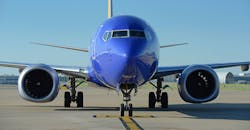SEC Fines Boeing, Ex-CEO Over 737 MAX Statements
The U.S. Securities and Exchange Commission dropped a $200-million fine on Boeing Co., and a separate $1-million fine on its former CEO Dennis A. Muilenburg, in relation to “misleading” public statements following two fatal accidents with 737 MAX series jets. Boeing and Muilenburg accepted the financial penalties without admitting or denying the SEC’s findings that they “negligently violated the antifraud provisions of federal securities laws,” as the agency reported.
“In times of crisis and tragedy, it is especially important that public companies and executives provide full, fair, and truthful disclosures to the markets. The Boeing Company and its former CEO, Dennis Muilenburg, failed in this most basic obligation,” stated SEC chairman Gary Gensler.
The first crash – of a Lion Air 737 MAX – occurred in Indonesia on October 29, 2018, killing all 187 passengers and crew members. Six months later, March 10, 2019, an Ethiopian Airlines 737 MAX crashed and killed all 157 passengers and crew members.
Boeing grounded all 737 MAX jets in March 2019 as the 20-month investigation into the incidents began, eventually assigning the cause to the aircraft’s Maneuvering Characteristics Augmentation System (MCAS), and software-based automated flight-control function. As charged by the SEC, Boeing and Muilenburg knew that MCAS represented “an ongoing airplane safety issue,” but nevertheless publicly represented the 737 MAX to be “as safe as any airplane that has ever flown the skies.”
In addition, following the Ethiopian Airlines incident, Boeing and Muilenburg publicly maintained that there had been nothing out-of-the-ordinary regarding MCAS during the Federal Aviation Administration’s 737 MAX certification process, although both Boeing and Muilenburg were aware of problems revealed during that sequence.
Following the grounding, Muilenburg made several public statements expressing assurance that federal regulators would restore the 737 MAX’s airworthiness certification. Boeing dismissed Muilenburg at the end of 2019, acknowledging that he had become a liability to the company’s trustworthiness.
The 737 MAX program regained FAA airworthiness certification in November 2020, after a revised flight-control program had been approved by the agency.
FAA investigators later established that Boeing executives pressured their own engineers responsible for authorizing the reliability of the aircraft’s systems to expedite the process of gaining certification.
Also, the U.S. Dept. of Justice last year reached a $2.5-billion deferred prosecution agreement with Boeing regarding the OEM’s role in misleading federal regulators about flight-safety risks of the 737 MAX aircraft.
